February 8, 2024
A Comprehensive Review of Webiny CMS

Nusrat Sarmin

In today's rapidly evolving digital age, effective content management is of utmost importance to establish a strong online presence. So, having a robust Content Management System (CMS) is like having a lifesaver for your website.
Webiny CMS – One of the most powerful solutions to streamline content management processes. Webiny goes beyond being just a CMS. It is a comprehensive no-code solution suite that empowers you to effortlessly create, manage, and distribute content.
Let’s explore the prominent features, advantages, and factors that set Webiny CMS apart from other content management solutions available on the market.
What Is Webiny?
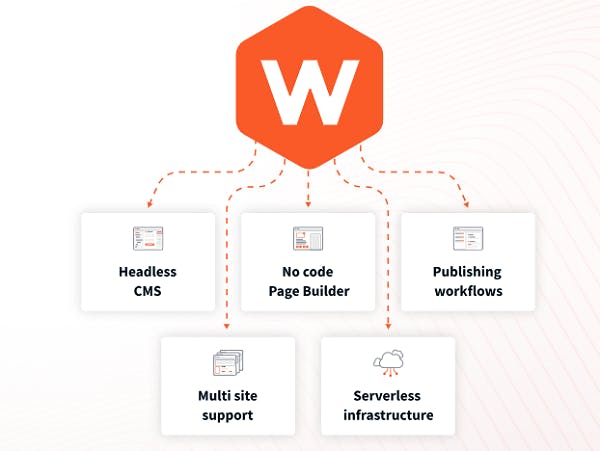
Webiny is a content management system specifically developed for enterprises. Built on a foundation of highly scalable AWS serverless infrastructure.
It combines the power of a headless CMS with the scalability and flexibility of serverless architecture. This unique blend enables developers to build, deploy, and scale content-rich applications effortlessly.
With its user-friendly interface and intuitive design, Webiny CMS allows users to easily create, edit, and publish content without any technical expertise. It provides a flexible and customizable platform that can be tailored to meet the specific needs of any business.
Webiny CMS also offers a variety of plugins and extensions, allowing users to enhance their websites with additional functionality and integrations. Overall, Webiny is a reliable solution for businesses to streamline their website management process and deliver a seamless user experience.
Webiny Is a Four-in-One Application
- Headless CMS: A Headless CMS designed for the purpose of writing and storing your articles, blog posts, and page content.
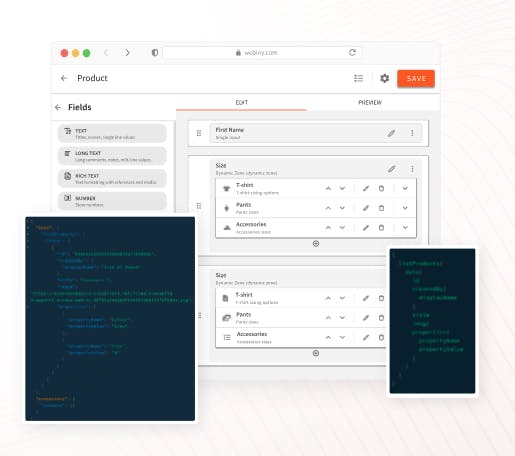
- File Manager: Webiny provides a convenient File Manager to store your images, videos, and other files that are served via CDN.
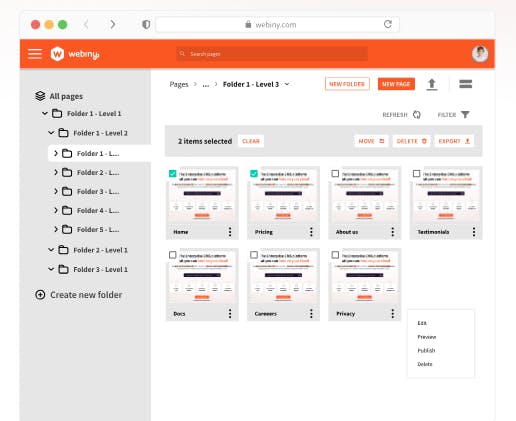
- Page Builder: Additionally, it offers a Page Builder feature, enabling you to effortlessly create static landing pages without requiring any assistance from developers.
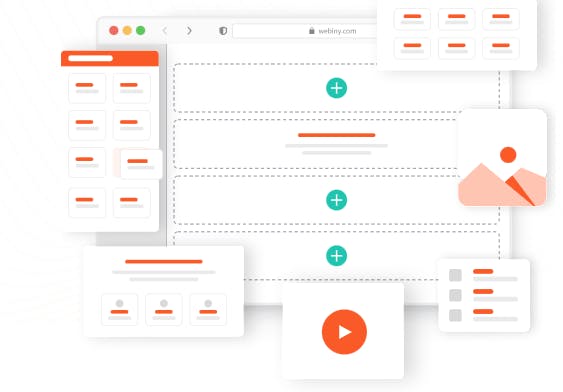
- Form Builder: Webiny includes a Form Builder tool, allowing you to create forms and receive submissions without relying on a third-party service or an engineering team.
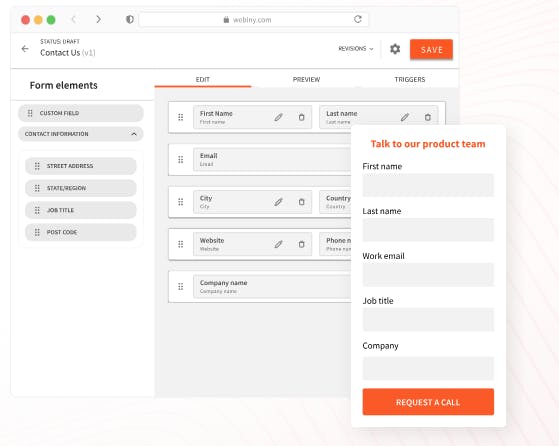
Who Are Using Webiny CMS?
Top Businesses that are utilizing the Webiny platform to develop their own applications or services: Motor Trend, Bayer, Amazon.com, Musth, BeyerDynamic, Costa Coffee, 98point6, etc.
Key Features of Webiny CMS?
Serverless Architecture
Webiny CMS is built upon a serverless architecture, which harnesses the capabilities of serverless computing. This innovative approach enables automatic scaling, alleviating the burden of infrastructure management and enhancing cost optimization.
Open-source
Webiny offers an open-source headless CMS solution that provides limitless possibilities for developers and enterprise businesses. With a focus on extensibility, this software is licensed under MIT and designed accordingly. You can make use of open-source resources to come up with innovative and distinct solutions. Additionally, Webiny has an active and dedicated open-source community. There are continuous enhancements due to the community-driven approach, leading to great contributions.
API-first CMS
Webiny is one of the top-rated API-first headless CMSs. With Webiny's API-first approach, developers have the freedom to use any technology stack they prefer, as long as it can communicate with the API. This makes Webiny CMS highly adaptable and compatible with a wide range of systems and tools.
GraphQL API
The Webiny CMS uses GraphQL as its main API language, which enables efficient data querying and manipulation. GraphQL allows clients to request specific data, enhancing performance and reducing excess fetching.
Plugin System
One notable feature of Webiny CMS is its ability to be extended through plugins. Developers have the option to create custom plugins that can customize the CMS according to specific requirements, effectively expanding its functionality. Webiny is primarily built using plugins. There is some boilerplate code, and the majority of Webiny's functionality, whether it's React, GraphQL API, or the Webiny CLI, can be found in plugins.
Multi-tenancy
Webiny's Multi-Tenancy feature allows for efficient multi-site management, allowing users to host and oversee numerous projects from one instance.
This simplifies operations and reduces costs. This feature makes it an ideal solution for companies in need of a cohesive and adaptable option for extensive digital environments.
Self-hosted
Webiny's Self-Hosted CMS offers complete control and privacy for businesses prioritizing data sovereignty and customization. The solution allows businesses to have full control over their digital experience, ensuring that data is stored and managed according to their terms.
Flexible Content Modeling
Webiny CMS stands out for its impressive content modeling capabilities, which empower users to customize the system according to their unique content structure. With the ability to define content types, fields, and relationships, users have the flexibility to tailor the CMS to their specific needs.
Webiny Admin App
Webiny CMS is a product that includes multiple apps. The main app is the Admin app, which lets users access and manage other apps. It serves as the central hub for content creation, organization, and publishing.
The Admin app has pre-built apps and a framework for developers to enhance their functionality and create custom apps. Here is also various plugins for different purposes. These plugins allow users to change the logo, modify the main menu, and add new features to the user interface. Additionally, the Admin app provides a scaffold template for creating CRUD apps quickly.
Webiny Control Panel
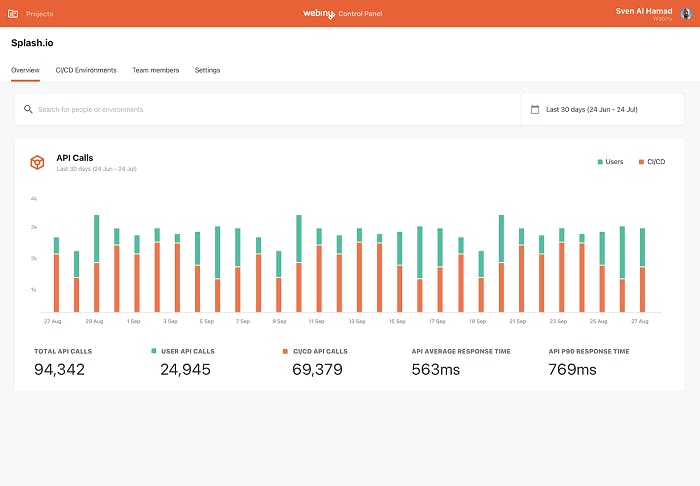
You can ensure site reliability and best practices by using the Webiny Control Panel. WCP is a cloud-based software as a service (SaaS) solution designed to enhance the performance and reliability of your self-hosted Webiny instance. It provides a range of tools and features that promote operational efficiency and reduce the workload for DevOps teams.
Here is a brief overview of some notable features that will be available in WCP.
- Application monitoring
- Cloud Cost Analysis
- Staged Deployments
- Point-in-time data recovery
- Alerting
Webiny Framework
The Webiny Framework is an open-source serverless application development framework. It is used as the foundation for Webiny CMS and other Webiny applications. It provides a powerful platform for customizing existing applications and building new ones.
With the Webiny Framework, you can extend any part of Webiny CMS, build full-stack applications, create GraphQL APIs, and develop multi-tenant SaaS applications.
The framework is written in Typescript and supports both Node.js and ReactJS for full-stack development.
Easy Integration
Webiny CMS supports popular SSGs like Gatsby, Next.js, Vue, Flatter and Nuxt.js out of the box. This means that developers can leverage the power of these frameworks to build static websites with ease. The integration is seamless, with Webiny providing a GraphQL API that can be used to pull data from the CMS and generate static files for the site.
Pulumi IaC
Webiny relies on Pulumi as its default infrastructure as a code (IaC) solution for defining and deploying cloud infrastructure for applications.
Webiny selected Pulumi as its default IaC solution based on several reasons.
- Cloud infrastructure is defined using TypeScript code.
- It provides support for various cloud providers such as AWS, Azure, Google Cloud Platform, and more.
- The program offers various options for storing infrastructure state.
- There is a growing and lively community.
Advanced Publishing Workflow
The Webiny Advanced Publishing Workflow is a cutting-edge feature designed to streamline the process of publishing content on the web. t enhances efficiency and accuracy by simplifying the review, approval, and publishing processes. Brands can Maintain consistent and high-quality content across all projects for a cohesive digital presence.
Webiny's Advanced Publishing Workflow empowers your content strategy by providing several benefits. such as:
- Content Quality Control
- Team Collaboration
- Role-Based Access
- Multi-User Review
- Tailor-made review process
- and more…
Typescript Support
Webiny offers comprehensive support for Typescript, allowing you to leverage type definitions throughout your entire project. This invaluable feature assists you in navigating and understanding your codebase more efficiently, enhancing the overall development experience.
SOC2 Compliant Setup
Webiny prioritizes the security of your setup by offering SOC2-compliant solutions. The deployment process involves setting up Webiny within your AWS account, where it strictly follows industry-standard security practices. This guarantees that your data remains protected and your applications operate in a secure environment.
Pros and Cons of Webiny CMS
| Pros | Cons |
|---|---|
|
|
When to Use Webiny?
Webiny CMS is a suitable choice for specific use cases due to its features and architecture. Here are some scenarios in which considering the use of Webiny CMS could be beneficial:
- Serverless Architecture Requirements:
Webiny is a suitable option for individuals interested in a CMS built on a serverless architecture. Serverless architectures offer advantages such as automatic scalability, reduced operational workload, and cost efficiency.
- Headless CMS Approach:
Webiny offers a headless CMS solution that enables businesses to effortlessly manage their content on multiple platforms without restrictions. If you require a headless CMS that allows you to deliver content to various front-end technologies, Webiny is an ideal choice.
- Open-Source Preference:
If you prefer open-source solutions and value the ability to inspect, modify, and contribute to the source code, Webiny's open-source nature can be a good fit for your preferences.
- Customization Needs:
Webiny CMS allows developers to build custom websites. It is flexible and extensible, offering a range of features and integrations. With Webiny CMS, you can easily customize your website to meet your specific requirements and branding. You can create custom content types, define data structures, and add or modify functionalities using its API-driven architecture.
- Multilingual Websites:
If you need to build a multilingual website, Webiny CMS has built-in support for managing content in multiple languages. You can easily translate and localize your content, making it easier to target different language markets and reach a wider audience.
- Scalability Requirements:
Webiny's serverless architecture is ideal for handling varying traffic levels and meeting scalability needs. The automatic scaling capabilities of serverless computing make it a suitable choice for projects of various sizes, from small blogs to enterprise-level applications.
However, it is important to evaluate your project requirements, team expertise, and long-term considerations before selecting Webiny CMS. Factors such as community support, documentation, and the overall maturity of the platform should be taken into consideration. It is tactful to stay updated with the latest updates and improvements in Webiny CMS or explore alternative solutions that may better suit your needs.
The Last but Not The Least
Webiny CMS goes beyond being a mere content management system; it serves as a catalyst for driving digital innovation. Whether you are an experienced developer in search of a robust tool or a content creator in need of a user-friendly platform, Webiny fulfills all your requirements. Take your content to new heights, embrace the future of web development, and let Webiny propel your online success. The web is waiting for you – are you prepared to conquer it with Webiny?
We Are StaticMania, - A specialized web development agency that excels in serverless web, headless architecture, static site generators, and Jamstack tools.
Need any help with Your Web development project? Contact us to discuss your specific requirements and how we can assist!

